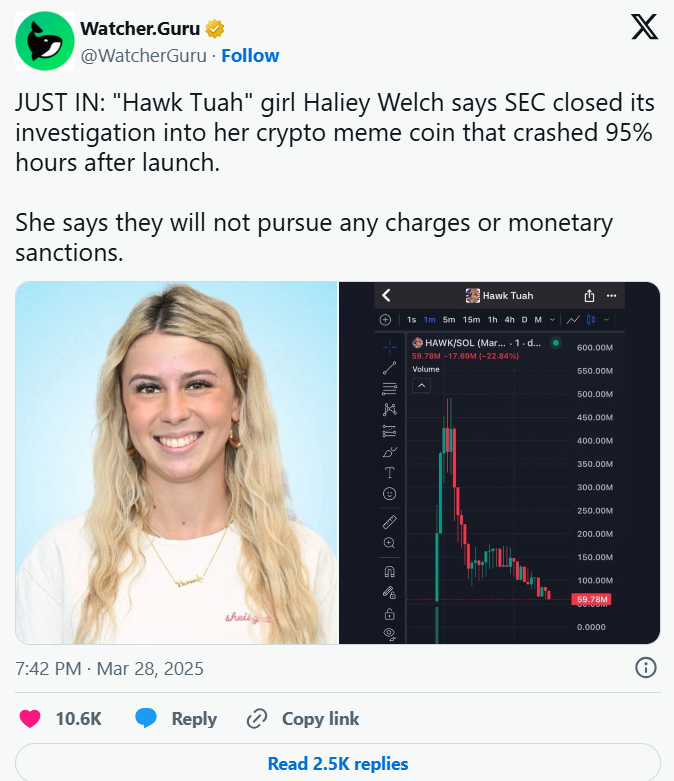SEC Lets Off the "Hawk Girl", But Her $HAWK Token Exposes More Serious Issues
In December 2024, when the meme token $HAWK endorsed by internet sensation Haley Welch (better known by her controversial nickname "Hawk Girl") hit the market, the meme craze instantly exploded. Within just a few hours, the token's market value soared to nearly $500 million, but then collapsed at an even more shocking speed, with over 90% of its value evaporating and leaving thousands of retail investors with devastating losses.
In the subsequent class-action lawsuit, while Welch did not face formal charges, her personal brand suffered significant damage. Although she issued a public statement attributing the crash to bot manipulation and promised to "fully cooperate" with lawyers to assist affected investors, the incident quickly became a typical case of conflict between celebrity brand monetization and crypto regulation.
Post-event analysis primarily focused on Welch herself: her age, lack of experience, and her stance shift from crypto critic to active promoter—all viewed as speculative behavior. However, these reports often overlook the true systemic vulnerabilities beyond the crypto bubble: Where was her advisory team? In this era of digital ownership, where are the professionals who should provide expert support amid rapidly evolving and uncertain new monetization methods?
Because the fact is evident: Haley Welch is not a lawyer, not a securities expert, and certainly not a crypto insider. We should never have had such expectations—this should have been the responsibility of her agent, manager, PR team, and legal advisors. At least, theoretically.
Forgotten Advisory Team Responsibilities
Celebrity management is far more complex than negotiating film contracts and arranging appearances. Its core lies in opportunity identification, revenue maximization, and reputation management, while simultaneously minimizing, mitigating, or avoiding risks. This requires not just assessing the scale of returns, but also weighing the terms of each collaboration, public perception, and reputation costs—especially in a volatile and high-legal-risk domain like crypto.
Entertainment lawyers should excel at identifying red lines in intellectual property and endorsement contracts; agents should have a keen eye for high-risk brand collaborations; managers should maintain a holistic view of their client's public image and career trajectory. Yet in transaction after transaction, we repeatedly witness the same pattern: celebrities diving headfirst into crypto token launches with zero understanding of how securities laws apply and no concept of potential project collapse.

Welch's case is just the tip of the iceberg. Kim Kardashian, Floyd Mayweather, and DJ Khaled have all been fined by the SEC for promoting crypto tokens without disclosing compensation; Tom Brady and Gisele Bundchen were collectively sued by investors for FTX endorsement; even Matt Damon, who was not involved in litigation, faced brand backlash for shooting the "Fortune Favors the Brave" ad during the 2022 collapse.
This is not an isolated incident but reveals a deeper industry ailment: advisory teams treating crypto as ordinary peripheral merchandise, failing to recognize its essence as a strictly regulated financial product.
Cognitive Misalignment and Product Misjudgment
An increasing number of celebrities and influencers form a fatal misconception—that crypto tokens are merely a new form of fan interaction following Non-Fungible Tokens, limited merchandise, and sponsored content. However, token attributes are worlds apart: when a token meets the securities standards established by the 1946 Supreme Court Howey Test, promoters will bear significant legal responsibility.
In this domain, lack of risk awareness is not an excuse for exemption. Promoting these assets without compliant disclosure and regulatory compliance is not only reckless but potentially illegal and career-ending.
The Sale of Trust
The anti-touting provisions in U.S. securities law aim to protect investors by requiring clear, fair information disclosure—especially when promoting investment products for compensation. In this era of viral spread, where a single tweet can trigger millions of dollars in speculative purchases, these rules are particularly crucial.
The SEC looks at results, not intentions. If someone promotes an investment (where people expect to profit from others' efforts) without proper disclosure or with misleading information, it's a regulatory issue. While celebrities often publicly bear the consequences, the true derelict parties are often the advisors who failed to conduct due diligence or simply didn't care.
This raises a deeper question about the fundamental difference between pure meme coins and celebrity-endorsed tokens. Most meme coins are driven by community and cultural trends, often absurdly designed, sustained by collective humor rather than implied utility or investment returns.
They are indeed high-risk—but the risks are transparent.
Celebrity-endorsed tokens operate on an entirely different logic. They carry an implicit trust promise borrowed from the celebrity brand, which fundamentally changes the game. Such tokens are no longer about insider jokes but more connected to personal reputation, image, and perceived influence. This is no longer a mere speculative game but a marketing action disguised as market momentum.
This is contrary to Bitcoin's original intent. Bitcoin was born to eliminate dependence on institutional or personal trust, establishing a peer-to-peer system where value can be verified through code, not personal charisma. From this perspective, celebrity coins are not just poor investment choices—they're a betrayal of crypto's founding philosophy, reintroducing the very mechanisms Bitcoin sought to circumvent.
Indeed, "buyer beware" is truth, but "seller (and their team) must be even more cautious" is the real essence. When hype supersedes substance and influence usurps integrity, what's damaged is not just the market, but the entire industry's mission.
Another Risk: When the President Sets the Worst Example
The situation becomes even more complex with the highest U.S. power institution now participating in high-risk behaviors long warned about by experts. Just days before his second inauguration, President Donald Trump launched two family brand meme tokens—first the TRUMP token, then a token named after his wife, MELANIA. These tokens' launch was accompanied by a comprehensive pro-crypto policy agenda, including proposals to revoke previous SEC enforcement actions and establish a "strategic Bitcoin reserve".
While legal, this dual identity of personal promoter and national policy maker raises serious questions about regulatory neutrality. When the lines between private financial interests and public policy begin to blur, setting clear standards for others—let alone a 25-year-old internet celebrity—becomes increasingly difficult.
However, the answer is not inaction. We need to call for greater responsibility and higher professional standards from those behind-the-scenes workers—those who should assess risks, provide advice, and protect, rather than merely profiting.

Whose Responsibility Is This?
Chasing trends has always been how celebrities maintain commercial value. But when it comes to financial products—especially speculative assets like meme tokens and stablecoins—the professionals drawing high salaries should be the most cautious.
Agents, managers, lawyers, take note: If you fail to protect your clients from reputation and legal risks, you are seriously derelict. If your understanding of crypto is insufficient to raise critical questions, then finding expert professionals becomes your obligation.
The explosion of the "Spitting Eagle Girl" incident was not due to Welch's recklessness, but because no one around her stopped to ask: "What exactly are we selling? What is the worst possible outcome?"
If this question could have been answered honestly and early on, the outcome might have been entirely different.







